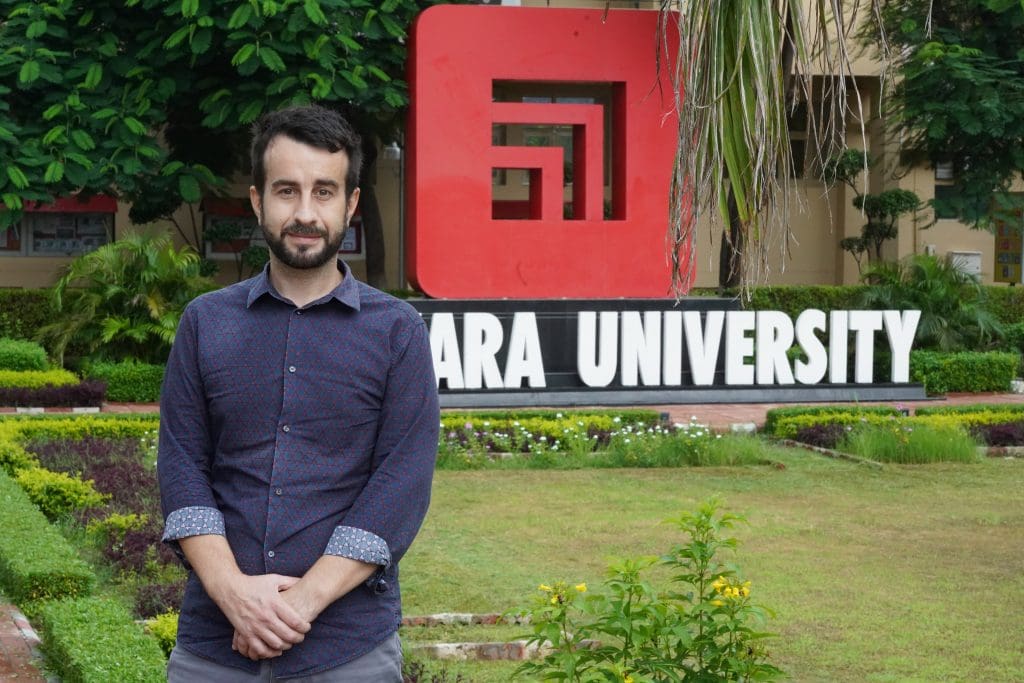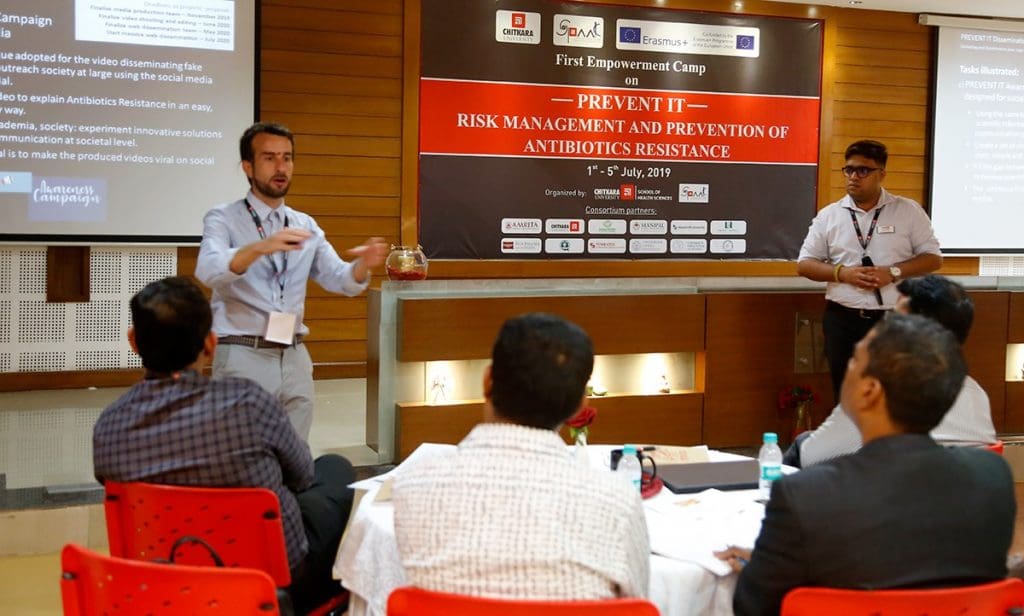Today’s Traveller invites Stefano Greco, Founder Director, Chitkara Spaak Centre for Multidisciplinary European Studies to share his insights on future trends in education and skillsets and why developing an accessible high-quality public education is the only approach to create inclusive higher education.

Today’s Traveller : Please explain the concept of the inclusive Social Ecosystem Model (SEM)?
Stefano Greco : It is a relatively new developmental model promoted some years ago by the G20 during the German and Argentinian presidencies. Contraposed to the inequalities generated by contemporary business practices, the Social Ecosystem Model aims to develop an inclusive and sustainable educational, social, and economic growth for city regions.
In simple terms, the idea is to utilize open digital technologies to establish permanent networks composed of educators, entrepreneurs, and representatives from the local public authorities and civil society. The mission of the Social Ecosystem Model is to break the current socio-economic trends, characterized by the unfair, unsustainable, and unethical distribution of wealth.
We live in a time where the number of billionaires is constantly increasing, the middle class is vanishing, and the inequalities inside the communities are continuously increasing. Is this sustainable? When we think of Silicon Valley, we automatically refer to digital enterprises, to success and money. Away from the mainstream image, the IT boom in California resulted in an unsustainable rise in real estate prices, leading to the gentrification of entire residential areas. Likewise, you’ve probably never heard of the explosion of chemical pollution resulting from the production of digital hardware.
Acknowledging the potential equality (and disparity) power of digital technologies, the SEM represents one of the possible answers to the contemporary unsustainable patterns. It is crucial to explain that the SEM – like any other innovative socio-political or economic model – will never emerge naturally.
In other words, the SEM could be implemented on a large scale, only after a breakthrough decision operated by political and financial leaders. To make the SEM work, the division of roles, duties, and tasks between public and private actors needs to be drastically reformulated, setting ethical demarcations for a better distribution of wealth.
Today’s Traveller : Do you see educational systems keeping up with the new parameters of education/skill development in a digital age?
Stefano Greco : Yes and no. As a logical deduction of what was discussed earlier, due to an inhomogeneous scenario it is not possible to provide a single answer. The digital era is expected to widen the gap between elite education and mass education. In the history of humanity, education has always been a conservative sector.
Simultaneously, ranging from kindergarten to the university level, education is gradually adapting the curricula to the digital age. Of course, updating methods of teaching is always a time-demanding exercise, subject to failures and revisions. To reimagine education does not imply the simple introduction of technology in the class. The most important and difficult challenge is to train students to be productive without the support of technology.

The advancement of robotics, as well as subsequent developments in the field of software and mechatronics, will change the labour market. As in the movies set in the future, machines and robots will replace humans for a multitude of tasks. In this scenario, the strategic responsibility for the education sector is to ensure that students master and command IT devices, rather than to contribute to the creation of a reverse scenario where students become completely dependent on technologies.
Today’s Traveller : How can inclusive education help institutions make their students job-ready for the future?
Stefano Greco : This question is relatively easy to answer. Mostly in democratic countries, learning based on uncritical memorization is obsolete, unproductive, and volatile. Inclusive education is a useful investment only when it is supported with valid learning methodologies. Schools and universities need to welcome people from disadvantaged backgrounds, but in order to empower these students, up-to-date learning outcomes are required.

Societal problems are becoming more complex. The current labour market request for problem-solving capabilities will be soon replaced by the recruiters’ demand for workers capable of analyzing and understanding problems.
In the current scenario, the competition in the workplace is likely to further increase the skills and remuneration gap in the labour force. Inclusive education is an essential component to tackle inequalities. At the same time, it is indispensable to remind that promotion of inclusive education is useless without parallel investments for pedagogies favouring the development of critical, analytical, and creative skills among the students.
Today’s Traveller : How do we create bridges to expensive higher education to make it available to those students who can’t afford it?
Stefano Greco : For this goal the role of the state and the public policies are crucial. There is no alternative solution. Governments are required to include education at the center of their budget laws. Developing an accessible high-quality public education is the only approach to create inclusive higher education.
Unfortunately, we often observe the opposite. Public financial investments in higher education, and education tout court, hardly meet the requirements on the field. There are several causes for this. In the first instance, the positive outcomes of investments in education arrive in the long term.
Governments aiming for electoral success are unlikely to invest in sectors that could bring positive results after a decade. The shortage of political vision is one of the tragedies of our troubled contemporary times. Due to diverse exogenous and endogenous factors, the national governments are progressively losing their traditional role of wealth redistribution. As a result, the societal responsibilities allocated to the state collide with the public financial straits.
In this scenario, a winning strategy to build an inclusive qualitative education must be matched by a serious and coordinated commitment of the global political and economical leaders in fighting corruption and fiscal avoidance, resolving any other issue behind the inability of the states to meet their traditional societal responsibilities.
Today’s Traveller : In what ways can we make education more aligned to reflect local job requirements and business growth?
Stefano Greco : Among the aforementioned challenges, this could be the easiest to solve. Similar to what is suggested in the Social Ecosystem Model, the local socio-economic scenario can be improved with the smart development and deployment of open digital technologies – combined with the effective integration of the best representatives from the education, business, civil society, and public sector.
The continuous interaction between educators and entrepreneurs could address the skill gap between graduates’ and employers’ requirements. The involvement of the local authorities could be instrumental to smartly invest the public funds for business growth. The involvement of civil society would ensure the creation of an inclusive developmental model, targeting social and environmental progress.
As the problems affecting our lives are constantly growing in terms of complexity, it is not advisable to give credit to gurus promising simple and dogmatic solutions to compounded problems. Not recognizing the unsustainability of our times is a mere attempt to be blind towards problems that before or later humanity will have to solve.
For how long can we continue to pass down collective problems to future generations? How will our generation be remembered in history books? The moment has come to ensure that technological innovation is paired with human development. This is no longer a choice, but an irreversible collective necessity.
Read more: Education



